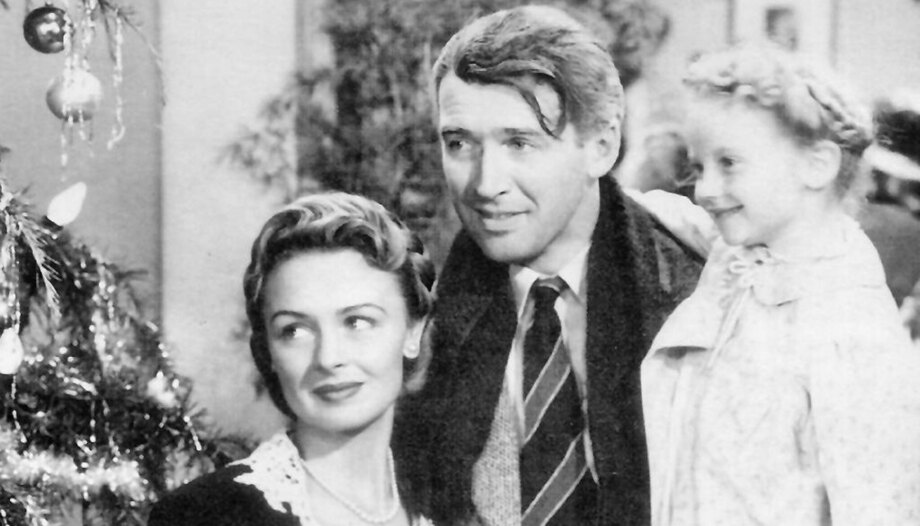Bob Welch is a writer, columnist, speaker and former adjunct professor of journalism at the University of Oregon in Eugene. In 2012 he published the book "52 Little Lessons from It's a Wonderful Life"where he extracts a weekly lesson for the whole year from the immortal film released in 1946 by Frank Capra (1897-1991). It is worth reading the book and getting to know these 52 lessons, which I am going to list as an appetizer in this article.
- God honors our "childlike faith": "Yes, but he has the candid faith of a child" (the angel Franklin).
- The underdogs matter: "Remember this, Mr. Potter: that rabble you speak of...works, pays, lives and dies in this community" (George Bailey).
- Sometimes you just have to dance: "Remember my little sister Mary, could you dance with her?" (Marty Hatch).
- The world cares about you: "It's funny, isn't it? Every man's life affects many other lives, and when he is gone it leaves a terrible void, doesn't it?" (Clarence).
- Self-pity distorts our vision: "I wish I had never been born" (George Bailey).
- Life's greatest adventures depend on people, not places or things: "Zuzu! Zuzu! My little doll!" (George Bailey).
- You can't run away from your problems: "Don't look now, but there's something strange going on at the bank, George. Actually, I've never seen one, but it has all the hallmarks of a bank panic" (Ernie the cab driver).
- To ask for advice is wise: "Sweet Caporal cigarette sign in Gower's store, which George notices as he ponders what to do when he notices that Mr. Gower, in his distress, has put poison in a bottle of capsules that he is to deliver".
- Stop to give thanks for what you have: "Bread! That this house may never know hunger. Salt! That life may always have flavor" (Mary, at the opening of the Martini's new home in Bailey Park). "And wine! That joy and prosperity may reign forever" (George, joining Mary's blessing at the Martini house).
- No impact without contact: "If you're going to help a man, you need to know something about him, don't you think?" (Joseph).
- When you are criticized, consider the source: "Then I guess I should give (the money) to miserable losers like you and that idiot brother of yours to squander" (Mr. Potter).
- Find your own Bedford Falls wherever you live: "Homesick? For Bedford Falls?" (George to Mary). "Yes" (Mary).
- There's no use trying to be no less than the neighbor: "Dad, our neighbors the Browns have a new car. You should see it" (Pete Bailey).
- Everything changes with perspective: "Oh, look at this wonderful old drafty house! Mary! Mary!" (George Bailey).
- Prayer changes everything: "I am the answer to your prayer. That is why I have been sent down here" (the angel Clarence, after George tells him, "I have been punched in the jaw in answer to my prayer").
- Delight in other people's achievements: "Very jealous. Very jealous. So jealous that he cannot contain his joy" (Billy to Henry Potter regarding George's reaction to the news that Harry has received the "Congressional Medal of Honor").
- Don't wait to tell someone you care about, "Dad, do you want to know something? I think you're an extraordinary guy" (George to his father over dinner).
- Every trip has a secret destination: "I'm going to see the world. Italy, Greece, the Parthenon..., the Colosseum. Then I'll come back here and go to college and see what they know... and then I'll build things..." (George Bailey).
- Don't look for what is, but what can be: "This old place is so romantic. I'd love to live here" (Mary, the night she and George throw stones and make wishes at the Granville's old mansion).
- It is by helping others that we help ourselves: "If I could accomplish this mission, could I perhaps earn my wings?" (Clarence to Franklin).
- Life is not a bed of roses: "Why have we had to live here in...this miserable, old, crummy town?" (George Bailey).
- It takes a whole village to raise a child: "They're not my children" (Mr. Potter). "But they are somebody's children" (Peter Bailey).
- Discreet lives can make a greater impact: "You know something, George? I think, in a modest way, we're doing something important. We are meeting a fundamental need. It's an ingrained aspiration in man to have his own roof, his own walls, and his own fireplace, and we're helping them get those things in our 'shabby little office'" (Peter Bailey).
- No man is an island: "We can get through this, but we have to stick together. We must have faith in each other" (George Bailey).
- God's greatest gift is life: "Tonight, at exactly ten forty-five o'clock, earth time, that man will be seriously thinking of spoiling God's greatest gift" (Franklin's voice). "Good heavens, his life!" (Clarence's voice).
- The greatest gift you can give is grace: "And you, Ed, remember when things weren't going so well for you and you couldn't make your payments? You didn't lose your house, did you? Do you think Potter would have let you keep it?" (George Bailey).
- There's a lot to be said for long-term commitments: "George Bailey, I'll love you till the day I die" (May Bailey as a child in the ice cream and soda store).
- Works are love, and not good reasons: "My office has given instructions to advance you up to twenty-five thousand dollars" (Telegram from Sam Wainwright).
- He looks for the best in people: "Here you go, you're broke, aren't you?" (George, as he reaches into his pocket for money to give to Violet Bick).
- Revenge is not our business, says the Lord: "What's the matter, Othello, are you jealous? Did you know there's a pool under this floor? And did you know that the button behind you makes the floor open? And did you know that George Bailey is dancing right where it opens? And that I have the key?" (Mickey to Freddie, at the high school dance, after George interrupts the latter's dance with Mary).
- Nobody's perfect..., which leads us to grace: "Harry Bailey, 1911-1919" (the inaccurate lifespan of Harry Bailey, on his tombstone, in Clarence's George-less world).
- The essence of life is relationships: "George, I'm an old man and most people hate me. But I don't like them either" (old Potter).
- What triggers real change is real humility: "Help me, Clarence. Give me back... Please, my God, let me live again" (George, after returning to the present).
- Fame does not equal success, nor does anonymity equal failure: "Unfit for service because of his hearing, George fought the battle of Bedford Falls... Anti-aircraft lookout... Picking up papers..., debris..., tires..." (Joseph describing George's prosaic duties during the war).
- Bitterness turns against the bitter person: "Frustrated and sick" (Description of Potter by Peter Bailey).
- The simple life helps us appreciate what is most meaningful: "Nobody ever changes here, you know that" (Uncle Billy to Harry when his nephew says to him at the train station, "Uncle Billy, you haven't changed a bit").
- High ideals are an honorable pursuit: "In my opinion he died a much richer man than you will ever be!" (George Bailey to Potter, regarding his father, Peter Bailey).
- Lost dreams can be found opportunities: "I wish I had a million dollars... Hot dog!" (George, as he tries the old-fashioned cigar lighter in Gower's store).
- All that glitters is not gold: "Oh, yes, George Bailey, whose ship has just arrived in port, assuming he's smart enough to come aboard" (Mr. Potter).
- People respond to honorable examples, "Why don't you go to the mob...and ask them for eight thousand dollars" (Mr. Potter to George, after the money disappeared).
- Helping others requires sacrifice: "That day George saved his brother's life. But he caught a bad cold that infected his left ear through which he would never hear again" (the angel Joseph).
- Search friends that bring out the best in you: "Mary is a good girl..., the kind of girl who will help you find the answers, George" (George's mother).
- Desperation can be a catalyst for great things: "How much do they want?" (newlywed Mary Bailey, offering a wad of bills from the wedding gift to desperate borrowing company clients).
- There are miracles: "George, it's a miracle! It's a miracle!" (Mary, as she prepares for the arrival of the citizens with their "offerings").
- Age is irrelevant; your way of living is not: "Oh, what a waste of youth!" (the man on the porch who thinks George should kiss Mary "instead of boring her to death with all that talk").
- The richest people in town might have little money: "A toast...to my older brother George. The richest man in town!" (Harry Bailey).
- The world needs more sentimental mumbo jumbo: "Sentimental mumbo jumbo!" (old Potter).
- Pay attention to the task at hand: "And did you put the envelope in your pocket?" (George) "Yes... yes... maybe... maybe" (Uncle Billy).
- People can change: "George Bailey? What does he want?" (Mary's irascible mother, Mrs. Hatch, upon learning that George has come to see her daughter).
- Entering a child's world expands your world: "Dad, will you fix my flower for me?" (Zuzu to her father, George).
- Some flowers are slow to bloom: "So affected that it borders on childish language" (a review in the New Yorker when the film was released).
- Life revisions strengthen the script: "Our Father who art in heaven..." (Uncle Billy, in the climactic final scene, as Capra originally wrote it).









